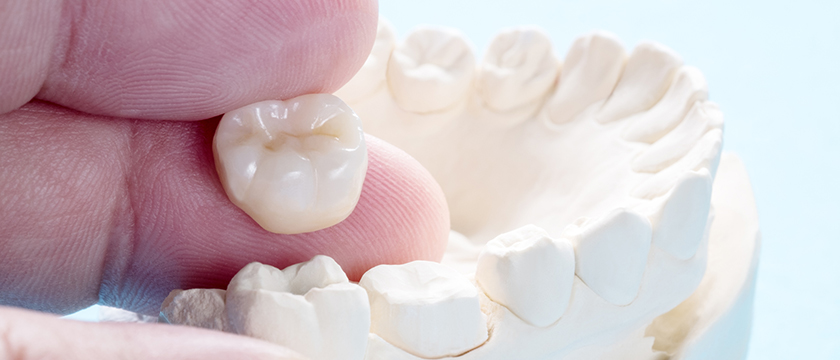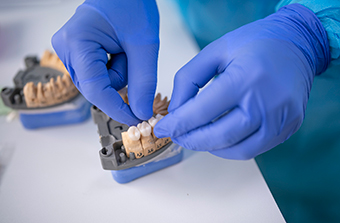 17 Jan 2022
17 Jan 2022
Whether you are getting one on its own or as part of a dental bridge, dental crowns are one of the most common types of dental restorations available today. Despite their prevalence, many patients are not convinced that they need a dental crown when their dentist suggests one.
If a dentist you are unfamiliar with recommends that you get crowns, it is natural to be skeptical. Many other treatments can be administered to extend the life of a tooth that will eventually need a crown. However, a dental crown will ultimately become the best option if you want to keep your tooth. Here are some common situations in which this is the case and how having teeth crowned can benefit your oral health.
6 Situations in Which You Should Consider Getting a Dental Crown
Your dentist may suggest a dental crown if you have:
- A Broken Tooth. A tooth that has cracked, chipped, or split is not only damaged, but structurally unsound: it can no longer absorb force the way it used to. Placing a crown over a damaged tooth supports its structural integrity and keeps it from fracturing under the stresses placed on it during your daily life. If you do not reinforce it, it is likely to break further.
- A Small or Misshapen Tooth. Many people experience microdontia, or naturally small teeth that look out of place compared to the rest of the teeth in their mouth. Placing crowns on these teeth can disguise this condition and make your smile look more aesthetically pleasing.
- A Tooth That Gets in the Way of Your Bite. Sometimes a single crooked or too-tall tooth is enough to throw off your entire bite, even if you have undergone extensive orthodontic rehabilitation. These problem teeth can be reshaped by crowns, allowing you to keep them intact while also creating better conditions to preserve your bite.
- A Severely Decayed Tooth. Teeth that have experienced severe decay become much weaker than teeth that have not, even if it has been repaired with a filling. This makes them more likely to crack or break during normal use. This is especially true for molars since these teeth are subject to the greatest biting and chewing forces. Placing crowns on these teeth restores their strength and makes it possible for you to keep them intact for much longer.
- A Tooth That Has Undergone a Root Canal. Root canals remove most of the inner structure of a tooth, leaving it vulnerable to breakage and decay. Covering these teeth with crowns builds them back up and allows them to function correctly as biting and chewing surfaces within your mouth.
- A Tooth with a Damaged or Loose Crown. Crowns are some of the longest-lasting dental restorations, but even they do not last forever. After around 10 or 15 years, many crowns begin to crack, chip, or develop decay along the margins. They may also become loose over time. These problems require the crown to be replaced so that the patient can continue to experience the high quality of life they were enjoying before the damage occurred.
4 Major Benefits of Dental Crowns
- They Strengthen Teeth. Dental crowns surround teeth with a durable shell made of porcelain, metal, resin, or other materials. This gives them the structural integrity to stand up to biting forces while protecting the tooth’s many surfaces from cavities.
- They Restore Teeth. If your teeth are not the size and shape they should be, you might experience some problems with speaking and eating. Crowns can be made to any specifications, allowing them to provide proper support for your muscles and jaw during these actions.
- They Are Fixed. Unlike dentures, crowns stay in one place and cannot be removed. This allows them to retain the look and function of your natural tooth and makes them much more comfortable to live with. If you are forced to choose between pulling a tooth or crowning it, it is always better to choose the crown. This is especially true if you are young and have many years ahead of you to enjoy the additional benefits that a crown offers.
- They Look Even Better Than Natural Teeth. A well-made crown looks like a natural tooth, but because it is a synthetic object, it can also be made perfect in ways that natural teeth cannot. Your dentist in Mississauga can make your dental crowns exactly the right size, shape, and colour you need to match and enhance your smile.
Get Beautiful, Long-Lasting Dental Crowns at Trillium Smile Dentistry
 Dental crowns may be more expensive and require you to sacrifice more tooth structure than some other restorations, but they are often the best treatment option for severely compromised teeth. If you have a tooth that you would like crowned, visit Trillium Smile Dentistry. Dr. Tousi has often been called the best dentist in Mississauga in reviews from her many happy patients, and the rest of the dental team is just as warm and professional as she is. Contact us today at 905-828-9894 or request an appointment online to discuss dental crowns or any of your other dental restoration needs.
Dental crowns may be more expensive and require you to sacrifice more tooth structure than some other restorations, but they are often the best treatment option for severely compromised teeth. If you have a tooth that you would like crowned, visit Trillium Smile Dentistry. Dr. Tousi has often been called the best dentist in Mississauga in reviews from her many happy patients, and the rest of the dental team is just as warm and professional as she is. Contact us today at 905-828-9894 or request an appointment online to discuss dental crowns or any of your other dental restoration needs.
